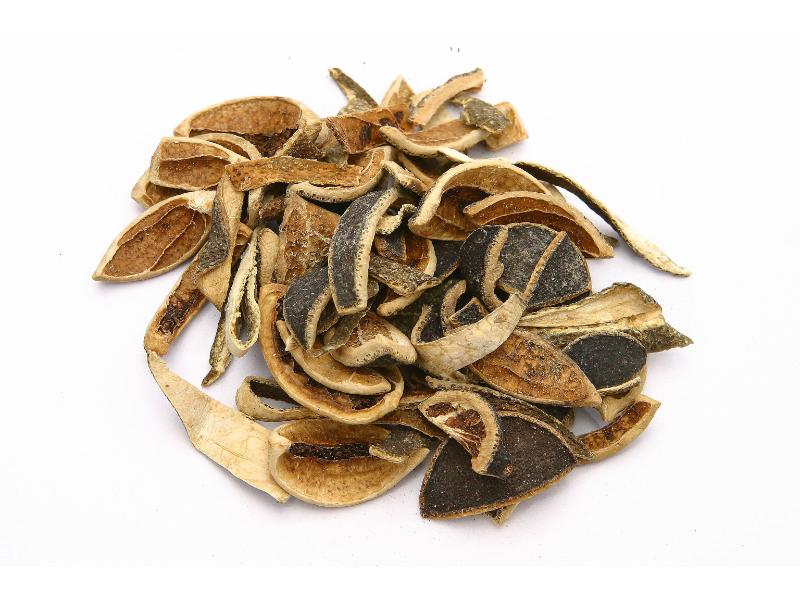Search in medicinals
Citri Reticulatae Pericarpium Viride
Unripe tangerine peel
青皮 〔青皮〕 qīng pí

Alternate Chinese names: 青柑皮 qīng gān pí; 青橘皮 qīng jú pí
Kingdom: Plant
Origin in PRC Pharmacopoeia: Citrus reticulata Blanco. (PRC Pharmacopoeia)
Origin in unofficial sources: Citrus tangerina Hort. et Tanaka; Citrus erythrosa Tanaka; Citrus unshiu Marcor. [= C. aurantium L. subsp. nobilis Makino]; Citrus subcompressa Tanaka; Citrus succosa Tanaka; Citrus kinokuni Tanaka; Citrus ponki Tanaka; Citrus reticulata Blanco*
Use: Medicinal
Category: Qì-rectifying agents
Properties: Bitter and acrid; warm.
Channel entry: Liver, gallbladder, and stomach channels.
Actions and indications: Qīng pí courses the liver and breaks qì, and also disperses accumulations and transforms stagnation. It is used for patterns of depressed liver qì with distending pain in the chest and rib-side, as well as for distending pain in the breast, possibly with lumps. It may also be used for swollen and painful welling-abscesses of the breast, as well as for cold mounting (hán shàn) pain. Qīng pí treats food accumulation with qì stagnation characterized by distension and pain in the stomach duct and abdomen. Qīng pí breaks qì and disperses binds, so it is used to treat qì stagnation with blood stasis, manifesting in concretions, conglomerations, accumulations, and gatherings.
Dosage and method: Oral: 3–10g.
Product description: (a) Sì huā qīng pí (四花青皮 Citri Reticulatae Pericarpium Viride Immaturum Incisum, four-petalled unripe tangerine peel) is the peel with four incomplete longitudinal incisions that give it the appearance of a four-petalled flower. The skin is blackish green on the outside and yellowish white on the inside yellowish white on the inside. (b) Gè qīng pí (个青皮 Citri Reticulatae Fructus Viridis, whole unripe tangerine) is the 2–2.5 cm in diameter, has a blackish green uneven skin. It is hard in substance, and when cut open the inner layers of skin appear as a yellowish white color. The skin is 1.5–3 mm thick.
Quality: Four-petalled unripe tangerine peel should be dark on the outside and pale on the inside, and it should have a high oil content. Whole unripe tangerine should be solid and have a thick skin and strong aroma.
Production area: Produced mainly in Fújiàn, Zhèjiāng, and Sìchuān, but also in Jiāngxī, Yúnnán, and Húnán.
Etymology: The name qīng pí 青皮 literally means green-blue skin.
See: Zhǐ jù zǐ (枳椇子 Hoveniae Fructus seu Semen, honey tree fruit)
Back to search result Previous Next